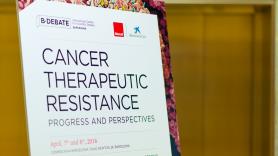1. Resistance to cancer treatments: a public health problem
“20 years ago, approximately half of all people diagnosed with cancer were still alive five years later. Now it’s nearly 70%,” explained Joaquín Arribas, director of the Preclinical Research Program at Vall d’Hebron Research Institute and one of the scientific leaders of this B·Debate. About 20 years ago, we also started using cancer drugs based on precision medicine: instead of destroying all the cells that divide, like classical chemotherapy, they target specific, highly altered cells in a tumor. This tends to make them more effective and with fewer side effects. Since then, most cancer drugs have been based on this philosophy, “Of the 45 drugs approved between 2009 and 2014, nearly all are based on pharmacological targets,” said Arribas.
Nevertheless, except in very few cases, the vast majority of these drugs end up failing. Tumors act like living communities that evolve extremely quickly, like an infection. Some of them are indifferent to treatment from the very beginning. Others evolve to find a way out: they accumulate various changes in their cells aimed at helping them survive, and in many cases they do. This is why early diagnosis is important, so that surgery (alone or in combination with radiotherapy and pharmacotherapy) can get rid of all of the cells before they have a chance to evolve.
Miquel Àngel Pujana, researcher at the Catalan Institute of Oncology (ICO, IDIBELL) and co-scientific leader of this B·Debate, explained the problem in figures, “In 2015, the ICO diagnosed 1,700 women with breast cancer and 300 cases of resistance to treatment, which has a huge impact in terms of health but also on an economic level: 50% of pharmaceutical spending for breast cancer goes to treating resistances.” With this motivation, ICO and IDIBELL decided to create the ProCURE program (Program Against Cancer Therapeutic Resistance), which encompasses nine research groups all fighting this problem and is led by Pujana.
Faced with this problem, the question arises: Did we overestimate the ability of precision medicine? Arribas doesn’t think so. For example, treatments of this kind have made certain types of leukemia a chronic condition, and for some breast tumors, “We now have four lines of treatment that be used, when a few years ago we couldn’t do anything,” he said. What happened is that “We underestimated the problem because we didn’t understand it.”
Now this issue is fundamental, and there are many approaches being studied to better understand and minimize it. One of these is understanding tumor genetics and evolution so we can stimulate the immune system to fight cancer.



